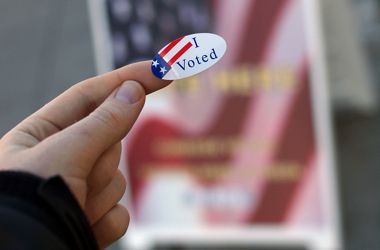Stress
How the Stress of Disaster Translates to “I Voted"
Considering the effects of Hurricane Sandy on social behavior (e.g., voting)
Posted November 6, 2012

Why voting (and telling others you voted) makes you feel good
In the aftermath of superstorm Sandy, the blogosphere was awash with pundits and political scientists attempting to predict the effect of the hurricane on voter turnout and ultimately, election outcome. There was speculation that voter turnout would be depressed, particularly in the hardest-hit areas, where people would be more consumed with securing their basic day-to-day necessities than seeking out a polling location. On the other hand, a study from political scientists John Gasper and Andrew Reeves have found that extreme weather affects how voters evaluate presidents and governors, and botching the response to a natural disaster can dash incumbents' hopes for reelection. And since Obama has been widely praised for his swift response to Hurricane Sandy, with the vociferous Republican Governor of New Jersey Chris Christie leading the charge, many pundits have looked to this storm as providing Obama with a natural boost.
Ultimately, the effect of the superstorm on voting turnout may have less to do with individuals' rational evaluation of the President's management of the crisis but more to do with the pure emotionality of this acutely stressful event. Hurricane Sandy has led to an outpouring of supportive volunteer efforts and financial donations from people all over the country, which reminds me of the feelings of unity and acts of compassion that those living in NYC during 9/11 shared with each other for days and weeks afterwards.
Although this behavior may not be a surprise to anyone who believes that humans are innately good, conventional research has suggested a gender difference in behavioral response to stress: typically, men are thought to take a "fight-or-flight" approach to stress, either becoming more aggressive or leaving the scene, while women are more likely to "tend-and-befriend," turning to their social ties for support and reaching out to help others. However, a recent study by Bernadette von Dawans and colleagues at the University of Freiburg, Germany, shatters this myth, finding that men subjected to an acute stressor also act more socially cooperative. The researchers found that contrary to prior expectations, an acutely stressful event stress actually increased men's kind and cooperative behavior. The higher the men's heart rates and cortisol levels (indicators of high stress levels), the more trusting, trustworthy and generous behavior they exhibited. In other words, the results of this study suggest that acute stress may actually lead to greater cooperative, social, and kind behavior among both men and women.
Such results shouldn't be surprising to us when we consider that humans are social animals by nature. Mountains of medical and psychological research over the years have demonstrated the importance of social connection to optimal physical and mental health, cognitive functioning, immune response, disease recovery and even longevity. Social connection may be especially important in circumstances of acute stress, because traumatic events and stressors naturally lead to feelings of vulnerability and a loss of control.
A study published in Psychological Science last year by Benjamin Converse and colleagues from the University of Virginia found that "when wanting and uncertainty are high and personal control is lacking, people may be more likely to help others. When people want an outcome over which they have little control, their donations of time and money increase." Consider the motivation behind grassroots donations, campaigning and voting in a very important election, where any one individual has little control and undoubtedly feels quite vulnerable, after weeks or even months of negative and fear-mongering political ads, phone calls and flyers.
Interestingly, people like to vote, and perhaps even more importantly, like advertising the fact that they have voted for the same reasons that people participate in more socially cooperative actions following acutely stressful events. On election day, people proudly wear an "I Voted" sticker, post "I Voted!" graphics to their Facebook or Twitter feed, or otherwise publicly state how they fulfilled their civic right on any number of social networks. Telling others "I VOTED!" creates a feeling of social cohesion, unity, and belonging, even if our political viewpoints may differ on the ballot we ultimately cast. Indeed, a 2009 political science study from Yale found that although low turnout should theoretically raise the value of each individual vote, emphasizing high turnout is more likely to motivate marginal voters. Considered together, the social bonding manifested through weathering the disaster inflicted by Hurricane Sandy as well as the need for connection and social acceptance suggests that the voter turnout this year could be higher than initially predicted. Because we are social animals, the social pressure to vote and the corresponding respect that comes from the public display and reciprocal acknowledgment that we have proudly exercised this American freedom is a great motivator. It's unfortunate, however, that the biggest displays of social cooperation are usually only seen in the wake of the most traumatic events.
References:
Converse, Benjamin A., Jane L. Risen, and Travis J. Carter. (2012). Investing in Karma When Wanting Promotes Helping. Psychological Science, 23(8), 923-930.
Gasper, J. T., & Reeves, A. (2011). Make It Rain? Retrospection and the Attentive Electorate in the Context of Natural Disasters. American Journal of Political Science, 55(2), 340-355.
Gerber, A. S., & Rogers, T. (2009). Descriptive social norms and motivation to vote: Everybody’s voting and so should you. The Journal of Politics, 71(1), 178-191.
von Dawans, B., Fischbacher, U., Kirschbaum, C., Fehr, E., & Heinrichs, M. (2012). The Social Dimension of Stress Reactivity Acute Stress Increases Prosocial Behavior in Humans. Psychological science, 23(6), 651-660.


